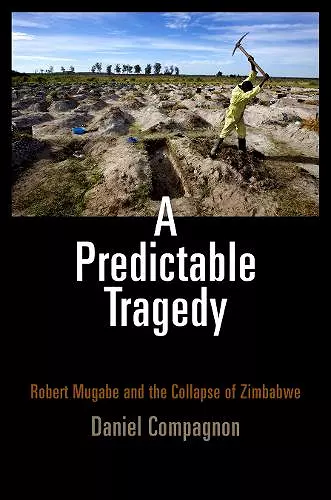A Predictable Tragedy
Robert Mugabe and the Collapse of Zimbabwe
Format:Paperback
Publisher:University of Pennsylvania Press
Published:24th Oct '13
Currently unavailable, and unfortunately no date known when it will be back

An unflinching analysis of how Robert Mugabe, a man once known as an anticolonial freedom fighter, became one of Africa's most hated autocrats, and why so many inside and outside Zimbabwe were long blind to his bloody misdeeds.
When the southern African country of Rhodesia was reborn as Zimbabwe in 1980, democracy advocates celebrated the defeat of a white supremacist regime and the end of colonial rule. Zimbabwean crowds cheered their new prime minister, freedom fighter Robert Mugabe, with little idea of the misery he would bring them. Under his leadership for the next 30 years, Zimbabwe slid from self-sufficiency into poverty and astronomical inflation. The government once praised for its magnanimity and ethnic tolerance was denounced by leaders like South African Nobel Prize-winner Desmond Tutu. Millions of refugees fled the country. How did the heroic Mugabe become a hated autocrat, and why were so many outside of Zimbabwe blind to his bloody misdeeds for so long?
In A Predictable Tragedy: Robert Mugabe and the Collapse of Zimbabwe Daniel Compagnon reveals that while the conditions and perceptions of Zimbabwe had changed, its leader had not. From the beginning of his political career, Mugabe was a cold tactician with no regard for human rights. Through eyewitness accounts and unflinching analysis, Compagnon describes how Mugabe and the Zimbabwe African National Union-Patriotic Front (ZANU-PF) built a one-party state under an ideological cloak of antiimperialism. To maintain absolute authority, Mugabe undermined one-time ally Joshua Nkomo, terrorized dissenters, stoked the fires of tribalism, covered up the massacre of thousands in Matabeleland, and siphoned off public money to his minions—all well before the late 1990s, when his attempts at radical land redistribution finally drew negative international attention.
A Predictable Tragedy vividly captures the neopatrimonial and authoritarian nature of Mugabe's rule that shattered Zimbabwe's early promises of democracy and offers lessons critical to understanding Africa's predicament and its prospects for the future.
"Compagnon's devastating analysis of the regime argues that the country's collapse was in fact the predictable outcome of the methods and approach Mugabe has always followed. . . . Compagnon¹s book stands out as the best account of the crisis to date." * Foreign Affairs *
"A masterpiece that will have a dignified shelf life in Zimbabwean studies. The book is well researched and detailed. Its arguments are convincing without being overly polemic. It leaves readers with no doubt about the culpability of Mugabe in the collapse of Zimbabwe." * African Studies Review *
"In this passionate book, Daniel Compagnon delivers an unrelievedly withering indictment of Zimbabwe's post-independence political regime. . . . Wide-ranging and detailed, the analysis is illuminating and provocative." * International Journal of African Historical Studies *
"Daniel Compagnon's book succeeds in its fundamental task: it describes in great detail how Robert Mugabe destroyed Zimbabwe. Indeed, it is highly unlikely that we will see a more comprehensive description of the Mugabe regime. While the exact endpoint of that regime remains to be determined, Compagnon's book will be seen as an authoritative account of how it wrecked a once-vibrant country." * Jeffrey Herbst, President, Colgate University *
"A Predictable Tragedy provides a comprehensive historical analysis of the nature of Robert Mugabe's rule. This is an important contribution because it shows that post-2000 Zimbabwe politics are not 'new' but the product of an authoritarian political system that began in 1980. Mugabe's regime is, and always has been, one of personal rule, Compagnon argues. Academics and domestic opponents were taken in by the regime's rhetoric of reconciliation, democracy, and socialism, failing to understand the true character of the regime. Only after 2000 did they begin to comprehend, and then very slowly and perhaps not yet fully, the Mugabe regime's commitment to hold power at all costs." * Norma Kriger, author of Guerrilla Veterans in Zimbabwe: Symbolic and Violent Politics, 1980-1987 *
ISBN: 9780812222890
Dimensions: unknown
Weight: unknown
336 pages